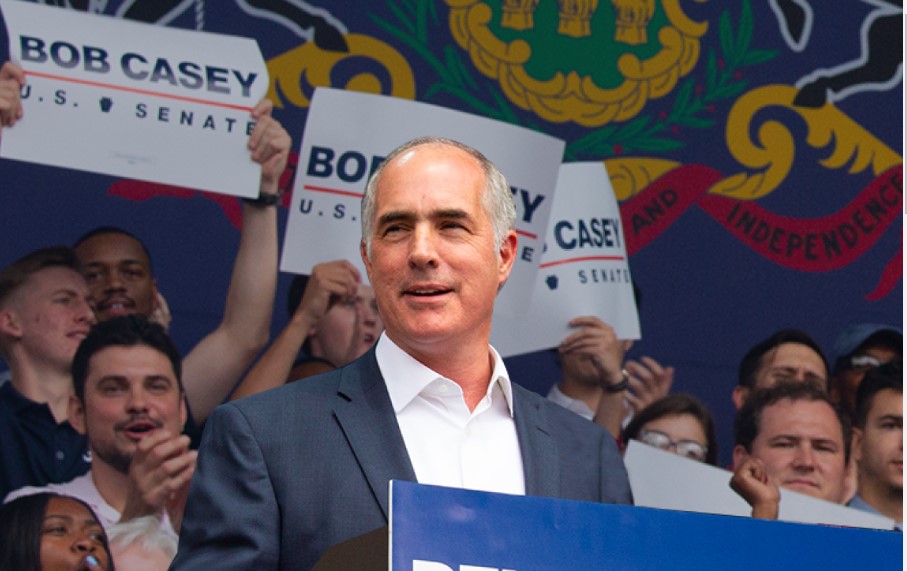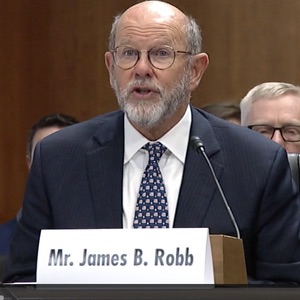Casey Increasingly Breaking With Dems as Biden’s Approval Fades

Many Democrats in Washington are trying to present a unified front ahead of what is expected to be a bitter 2024 election season.
Bob Casey apparently disagrees.
The Pennsylvania senator is increasingly breaking with President Joe Biden, voting against legislation championed by the Democratic president in what analysts say is a bid to protect the vulnerable Senate seat next year.
Casey has reason to be nervous. At present, the usually reliable swing state of Pennsylvania barely went for Biden in 2020, with the Democrat claiming victory there by less than 1.20 percentage points. Recent polling shows Biden and Trump virtually tied in the state, suggesting a possible shift in Trump’s favor for the state’s critical 20 electoral votes.
Casey has historically enjoyed far more comfortable margins in his Senate races. He has won two of his three contests by double-digit margins and the other by nearly that much. Still, data show him breaking from mainline Democratic party-line votes increasingly as the year has gone on.
A FiveThirtyEight analysis shows Casey voting nearly 20 percent less in favor of Biden-backed bills in the 118th Congress as compared to the 117th, having voted 98.5 percent with Biden in the latter and just 78.6 percent in the former.
“While most Democratic senators still agree with Biden over 80 percent of the time, these declines are significant,” FiveThirtyEight’s Cooper Burton wrote. “As a whole, Democratic senators are voting Biden’s way 11 points less than in the last Congress.”
Jim McLaughlin, president of the strategy and consulting firm McLaughlin & Associates, pointed to a recent Quinnipiac poll in which Biden’s numbers, he said, were “horrible.”
“He had a 58 percent unfavorable rating and a 57 percent disapproval rating, and among the all-important independents, 68 percent disapproved of President Biden,” McLaughlin said, “not to mention, Donald Trump was beating Biden in the presidential race.”
“The failures and corruption of the Biden administration have turned Scranton Joe into Swampy Joe,” McLaughlin continued.
“Casey is scared to death,” he said.
Casey’s seat is one Democrats cannot easily afford to lose. Republicans are just a few seats away from a majority in the Senate. Losses in Pennsylvania and other Democratic-vulnerable states, including Montana, Arizona, and West Virginia, could easily push control of that chamber to the GOP, dealing a serious blow to Biden’s legislative ambitions should he win again in 2024.
The national GOP has taken note.
“From the southern border to crime to inflation, Bob Casey is out of step with Pennsylvania voters on every issue,” said National Republican Senatorial Committee spokesman Philip Letsou. “Throwing inconsequential votes won’t be enough to cover up Bob Casey’s career of rubber-stamping Democrats’ agenda.”
Casey may very well cruise to re-election, nonetheless. A Franklin & Marshall poll in April showed him enjoying a healthy lead over potential GOP challenger Dave McCormick, 42 percent to 35 percent.
Still, the weight of slumping Democratic numbers could take its toll on Casey’s prospects. In addition to Biden’s slumping approval rates, Casey’s fellow Pennsylvania Democratic Sen. John Fetterman is also seeing cratering opinions among voters.
The Quinnipiac poll showed 50 percent of voters holding an unfavorable opinion of Fetterman, who, after being sworn in, spent a protracted in-patient stay in a hospital for treatment of depression and who has constantly struggled with basic speech and communication stemming from a stroke he suffered in 2022.
Please follow DVJournal on social media: Twitter@DVJournal or Facebook.com/DelawareValleyJournal



